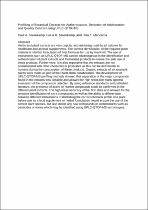 ResearchSpace
ResearchSpace
Profiling of botanical extracts for authentication, detection of adulteration and quality control using UPLC-QTOF-MS
JavaScript is disabled for your browser. Some features of this site may not work without it.
- ResearchSpace
- →
- Research Publications/Outputs
- →
- Book Chapters
- →
- View Item
| dc.contributor.author |
Steenkamp, Paul A

|
|
| dc.contributor.author |
Steenkamp, Lucia H

|
|
| dc.contributor.author |
Mancama, Dalubuhle T

|
|
| dc.date.accessioned | 2019-03-07T09:46:18Z | |
| dc.date.available | 2019-03-07T09:46:18Z | |
| dc.date.issued | 2018-01 | |
| dc.identifier.citation | Steenkamp, P.A., Steenkamp, L.H. and Mancama, D.T. 2018. Profiling of botanical extracts for authentication, detection of adulteration and quality control using UPLC-QTOF-MS. Food Supplements Containing Botanicals: Benefits, Side Effects and Regulatory Aspects, pp 303-347. | en_US |
| dc.identifier.uri | https://link.springer.com/chapter/10.1007/978-3-319-62229-3_10 | |
| dc.identifier.uri | http://hdl.handle.net/10204/10744 | |
| dc.description | Copyright: 2018 Springer. Due to copyright restrictions, the attached PDF file only contains the abstract of the full text item. For access to the full text item, kindly consult the publisher's website. | en_US |
| dc.description.abstract | Herbs and plant extracts are very popular and are being used by all cultures for healthcare and as food supplements. The correct identification of the required plant material is vital for formulation of final formulas for use by mankind. The use of instruments such as UPLC-QTOF-MS can be advantageous in the identification and authentication of plant extracts and formulated products to ensure the safe use of these products. Furthermore, it is also imperative that the extracts are not contaminated with other chemicals or pesticides as this can be detrimental to humans during the consumption of these products. Organic extracts of six example plants were made as part of the PlantLIBRA collaboration. The development of UPLC-QTOF-MS profiling methods showed that separation of the major compounds found in the extracts was possible and allowed for high resolution mass spectral evaluation of the compounds detected. By using reference standards and published literature, the presence of active or marker compounds could be confirmed in the different plant extracts. The high mass accuracy of the TOF data also allowed for the tentative identification of extra compounds as well as the ability to differentiate between different formulations. Establishing the correct chemical profile of a plant before use as a food supplement or herbal formulation, would ensure the use of the correct plant species, but also detect any new compounds or contaminants such as pesticides or toxins which may be identified using UPLC- QTOF-MS technologies. | en_US |
| dc.language.iso | en | en_US |
| dc.publisher | Springer | en_US |
| dc.relation.ispartofseries | Worklist;21264 | |
| dc.relation.ispartofseries | Worklist;21797 | |
| dc.subject | Cinnamomum verum | en_US |
| dc.subject | Valeriana officinalis | en_US |
| dc.subject | Boswellia serrata | en_US |
| dc.subject | Passiflora incarnata | en_US |
| dc.subject | Peumus boldus | en_US |
| dc.subject | Harpagophytum procumbens | en_US |
| dc.subject | Food supplements | en_US |
| dc.subject | UPLC-QTOF-MS | en_US |
| dc.title | Profiling of botanical extracts for authentication, detection of adulteration and quality control using UPLC-QTOF-MS | en_US |
| dc.type | Book Chapter | en_US |
| dc.identifier.apacitation | Steenkamp, P. A., Steenkamp, L. H., & Mancama, D. T. (2018). Profiling of botanical extracts for authentication, detection of adulteration and quality control using UPLC-QTOF-MS., <i>Worklist;21264</i> Springer. http://hdl.handle.net/10204/10744 | en_ZA |
| dc.identifier.chicagocitation | Steenkamp, Paul A, Lucia H Steenkamp, and Dalubuhle T Mancama. "Profiling of botanical extracts for authentication, detection of adulteration and quality control using UPLC-QTOF-MS" In <i>WORKLIST;21264</i>, n.p.: Springer. 2018. http://hdl.handle.net/10204/10744. | en_ZA |
| dc.identifier.vancouvercitation | Steenkamp PA, Steenkamp LH, Mancama DT. Profiling of botanical extracts for authentication, detection of adulteration and quality control using UPLC-QTOF-MS.. Worklist;21264. [place unknown]: Springer; 2018. [cited yyyy month dd]. http://hdl.handle.net/10204/10744. | en_ZA |
| dc.identifier.ris | TY - Book Chapter AU - Steenkamp, Paul A AU - Steenkamp, Lucia H AU - Mancama, Dalubuhle T AB - Herbs and plant extracts are very popular and are being used by all cultures for healthcare and as food supplements. The correct identification of the required plant material is vital for formulation of final formulas for use by mankind. The use of instruments such as UPLC-QTOF-MS can be advantageous in the identification and authentication of plant extracts and formulated products to ensure the safe use of these products. Furthermore, it is also imperative that the extracts are not contaminated with other chemicals or pesticides as this can be detrimental to humans during the consumption of these products. Organic extracts of six example plants were made as part of the PlantLIBRA collaboration. The development of UPLC-QTOF-MS profiling methods showed that separation of the major compounds found in the extracts was possible and allowed for high resolution mass spectral evaluation of the compounds detected. By using reference standards and published literature, the presence of active or marker compounds could be confirmed in the different plant extracts. The high mass accuracy of the TOF data also allowed for the tentative identification of extra compounds as well as the ability to differentiate between different formulations. Establishing the correct chemical profile of a plant before use as a food supplement or herbal formulation, would ensure the use of the correct plant species, but also detect any new compounds or contaminants such as pesticides or toxins which may be identified using UPLC- QTOF-MS technologies. DA - 2018-01 DB - ResearchSpace DP - CSIR KW - Cinnamomum verum KW - Valeriana officinalis KW - Boswellia serrata KW - Passiflora incarnata KW - Peumus boldus KW - Harpagophytum procumbens KW - Food supplements KW - UPLC-QTOF-MS LK - https://researchspace.csir.co.za PY - 2018 T1 - Profiling of botanical extracts for authentication, detection of adulteration and quality control using UPLC-QTOF-MS TI - Profiling of botanical extracts for authentication, detection of adulteration and quality control using UPLC-QTOF-MS UR - http://hdl.handle.net/10204/10744 ER - | en_ZA |





